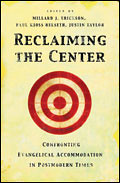In his chapter, "Postconservatism: A Third World Perspective," Kwabena Donkor makes the argument that postconservative theology is inherently pragmatist. Given what I understand about the leaders discussed in this book and elsewhere, I would wholeheartedly agree. What I find dangerous about a theology that is pragmatist is that pragmatism as a school of thought is, I believe, inevitably incompatible with orthodox Christian thought.
Pragmatism as a philosophy is probably the only uniquely American school of philosophy and although postconservatism does not call itself Pragmatist, it holds some very important traits in common. (There are clearly nuances to the following list, but I think this boils a lot of it down to its essentials.) Pragmatism does not believe that anything substantial can be said about current, transcultural reality; postconservatism agrees. Pragmatism believes that we are held hostage by our language to the point that "truth" cannot be conveyed across cultures; postconservatism agrees. Pragmatism believes that the most important factor in an individual's belief structure is their given community-communities construct reality; postconservatism agrees. (For a more in-depth look at Pragmatism and a critique thereof, read this paper by Douglas Groothuis.)
What I find ultimately interesting is that Pragmatist philosophers understand and embrace the logical extensions and conclusions of their beliefs while postconservatism has yet to do the same. Modern-day Pragmatists such as Richard Rorty have long laid aside any attempt at what he calls "systematic philosophy" and have given up the search for truth as literally meaningless. If we cannot get to any sense of truth beyond our culture/language community, then it is literally meaningless to talk of it.
Current postconservative theology and philosophy is combining two very dangerous beliefs which, when taken to their logical conclusions, lead us to an island of metaphysical relativism. As I have pointed out in the other posts, many of the leading thinkers in the movement hold to a postmodern view of language. Add to that the view that the faith community is formative theologically (not subsequent to theology, but either co-creative with or prior to), and you have a recipe for theological and ecclesiological disaster.
Currently, postconservative thinkers and writers still speak in objective and transcultural terms, but that is, I believe, because they have not yet embraced their beliefs completely. Take this passage from Rorty's aptly named book, The Consequences of Pragmatism, where he lays out in no uncertain terms some logical extensions of his philosophical system:
Pragmatists doubt that there is much to be said about this common feature [the notion of truth]. They doubt this for the same reason they doubt that there is much to be said about the common feature shared by such morally praiseworthy actions as Susan leaving her husband, America joining the war against the Nazis, America pulling out of Vietnam, Socrates not escaping from jail, Roger picking up litter from the trail, and the suicide of the Jews at Masada. They see certain acts as good ones to perform, under the circumstances, but doubt that there is anything general and useful to say about what makes them all good. The assertion of a given sentence -or the adoption of a disposition to assert the sentence, the conscious acquisition of a belief -is a justifiable, praiseworthy act in certain circumstances. But, a fortiori, it is not likely that there is something general and useful to be said about what makes All such actions good-about the common feature of all the sentences which one should acquire a disposition to assert.
Whether postconservatism will go as far as this in the development of its theology and philosophy is yet to be seen, but I would imagine that the best thing to do is to stay as far away from it as possible.

2 comments:
"'They see certain acts as good ones to perform, under the circumstances, but doubt that there is anything general and useful to say about what makes them all good.'"
This is why I'm not sure pomo/emergent theology is entirely pragmatic, or at least won't be carried out completely to its logical ends. From my conversations with the lower level people on blogs (not entirely representative, I know), there appears to be a strong desire to recognize the process of de/reconstruction, as well as the jettisoning of modern ideals, as inherently good. There is also the emphasis on "dialogue" as the correct process for doing theology, which is actually a values driven methodology. Even when they do all this in a qualified manner, I think it smacks of metanarrative-type thought which holds them back from being fully pragmatic.
There is a lot to be said for your thoughts on this. I think what I am most concerned with are the underlying similarities which bind Emergent thought to Pragmatism on some pretty fundamental levels.
I certainly hope that a vestage of metanarrative thought remains and keeps the movement from sliding too far, but I wonder if they have the philosophical and theological tools in their tool box to do so.
Post a Comment